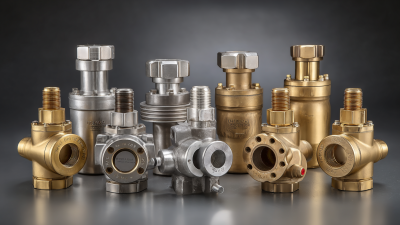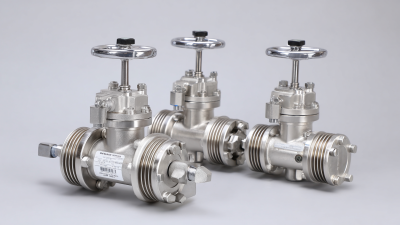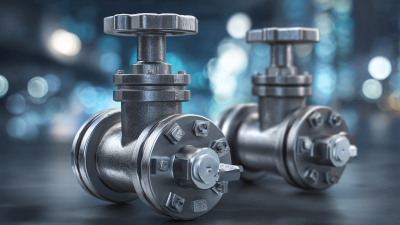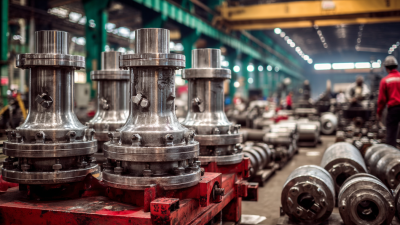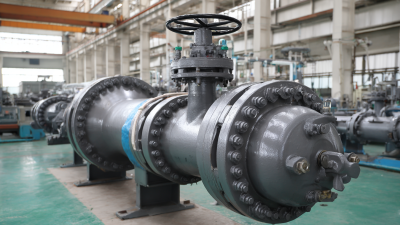+86 19720579616

+86 19720579616

 Zalo
Zalo

In the realm of fluid control systems, the efficiency and reliability of valves play a crucial role in maintaining operational integrity and performance. Among various types of valves, Din Bellows Sealed Globe Valves have emerged as essential components, particularly in applications where leakage prevention and precise flow regulation are paramount. According to a recent report by the Global Valve Market, the demand for high-performance valves, including bellows sealed variants, is projected to grow at a CAGR of 5.2% from 2022 to 2030, driven by the increasing need for safety and reliability in industries such as oil and gas, chemical processing, and water treatment.
The innovative design of Din Bellows Sealed Globe Valves effectively mitigates the risks associated with traditional valves, particularly in handling hazardous fluids. By incorporating a bellows sealing mechanism, these valves minimize the potential for leakage, which, according to the American Petroleum Institute, can lead to significant financial losses and environmental impacts. Moreover, a study published in the Journal of Fluid Engineering highlights that bellows sealed valves demonstrate superior performance in terms of durability and maintenance, making them an investment worth considering for companies focused on optimizing their fluid control systems. By understanding the critical advantages offered by Din Bellows Sealed Globe Valves, industries can enhance their operational efficiency and uphold stringent safety standards.

 DIN bellows sealed globe valves play a critical role in ensuring reliable fluid control within various industrial applications. These valves are specifically designed to prevent leakage, which is paramount in processes where safety and environmental protection are key concerns. According to a report by the American Society of Mechanical Engineers, leakages from traditional sealing methods can result in significant operational inefficiencies and environmental hazards, leading to increased operational costs and regulatory fines.
DIN bellows sealed globe valves play a critical role in ensuring reliable fluid control within various industrial applications. These valves are specifically designed to prevent leakage, which is paramount in processes where safety and environmental protection are key concerns. According to a report by the American Society of Mechanical Engineers, leakages from traditional sealing methods can result in significant operational inefficiencies and environmental hazards, leading to increased operational costs and regulatory fines.
In fluid control systems, the ability of DIN bellows sealed globe valves to maintain a tight seal under high pressure and temperature ensures optimal performance and longevity. Reliable sealing mechanisms also contribute to enhanced productivity by minimizing downtime related to maintenance and repairs. Industry studies indicate that implementing bellows sealed technology can reduce maintenance costs by up to 30%, providing a compelling argument for their use in critical fluid transport scenarios.
Tips: When selecting DIN bellows sealed globe valves, consider the specific pressure and temperature requirements of your system. Regular inspections and maintenance can help ensure that these valves continue to perform efficiently, safeguarding your operations against unexpected fluid leakages. Additionally, always opt for valves that comply with international standards to ensure compatibility and reliability.
Din bellows sealed globe valves are crucial for ensuring reliable fluid control in various industrial applications. The mechanism behind these valves combines a traditional globe valve design with a specialized bellows seal. The bellows, typically made from materials resistant to corrosion and wear, create a tight seal that prevents fluid leakage, even under high pressure or temperature variations. This feature is particularly significant in processes requiring stringent safety measures.
One key benefit of using Din bellows sealed globe valves is their ability to handle aggressive fluids without compromising integrity. When selecting these valves, consider the compatibility of the bellows material with the intended fluid. Regular maintenance is essential to monitor for wear and tear, as a well-maintained valve can significantly extend service life and improve performance.
Tip: Always consult the manufacturer's specifications for the proper installation and operation parameters to ensure optimal performance of your bellows sealed globe valves. Additionally, implementing a routine inspection schedule can help identify potential issues early and maintain reliable fluid control in your systems.
| Feature | Description | Benefits |
|---|---|---|
| Bellows Sealing | Employs an elastomeric bellows to prevent leakage. | Prevents contamination and enhances safety. |
| Flow Control | Precise control of fluid flow rates. | Improves efficiency in process systems. |
| Durability | Made of high-strength materials. | Long lifespan and reduced maintenance costs. |
| Versatility | Suitable for various fluid types and temperatures. | Adaptable for multiple applications. |
| Low Maintenance | Simple design reduces wear and tear. | Cost-effective operation over time. |
DIN bellows sealed globe valves offer several key advantages that make them superior to traditional valve options for fluid control. One of the primary benefits is their exceptional sealing capability, which effectively prevents leaks. The bellows design creates a tight seal that protects the valve’s stem and internal mechanisms from contact with the fluid, minimizing the risk of contamination and ensuring the integrity of the system. This is especially crucial in applications involving hazardous or expensive fluids, where even minor leaks can lead to significant losses and safety hazards.

Another significant advantage of DIN bellows sealed globe valves is their durability and longevity. Unlike conventional valves that may require frequent maintenance or replacement due to wear and tear from fluid dynamics, bellows sealed valves are designed to withstand extreme conditions without compromising performance. The robust construction and lack of packing glands contribute to a reduced need for maintenance, leading to lower operational costs over time. Additionally, these valves provide smooth and precise flow control, ensuring optimal performance in various applications, from industrial processes to chemical handling.
When it comes to fluid control valves, compliance with industry standards is paramount. According to the Valve Manufacturers Association of America (VMA), nearly 60% of valve failures can be traced back to improper selection or inadequate compliance with performance metrics. This highlights the importance of utilizing valves, such as Din Bellows Sealed Globe Valves, which meet stringent industry standards like API 602 and ANSI/ASME B16.34. These standards ensure that the valves operate efficiently under high pressure and temperature conditions, making them essential in sectors like oil and gas, chemical processing, and water treatment.
Furthermore, performance metrics play a crucial role in assessing the reliability of fluid control solutions. A report by the International Society for Automation (ISA) reveals that the use of properly certified globe valves can reduce leak rates by up to 90%. This reduction in leakage not only enhances safety and environmental compliance but also translates into significant cost savings in maintenance and downtime for operators. As industries continue to prioritize sustainable practices, the emphasis on using compliant and high-performance valves like Din Bellows Sealed Globe Valves becomes increasingly essential in achieving operational excellence and regulatory adherence.
The significance of using Din bellows sealed globe valves in fluid control systems cannot be overstated, particularly when it comes to leakage rates and maintenance costs. Recent studies indicate that traditional valve designs can leak up to 5% of the total fluid flow, resulting in substantial economic losses and environmental concerns. In contrast, bellows sealed globe valves boast leakage rates as low as 0.1%, drastically minimizing both losses and the need for frequent repairs.
Moreover, maintenance costs related to valve systems are significant contributors to overall operational expenses. According to a report by the Valve Manufacturers Association, valve maintenance can account for up to 30% of total plant maintenance budgets. By investing in high-quality Din bellows sealed globe valves, facilities can reduce their maintenance requirements, with studies showing a potential cost saving of 20-25% over time.
Tips: When selecting valves for your system, prioritize those with minimal leakage rates to lower your overall energy costs. Regular inspection and maintenance of your valves can significantly extend their lifespan and reliability. Additionally, consider investing in training for your staff on proper valve operation and maintenance to further reduce costs and inefficiencies.

